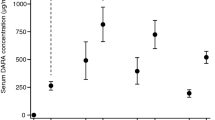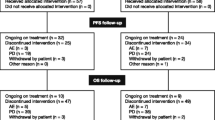Abstract
We report the first clinical investigation conducted in Japan to confirm the safety, tolerability, and pharmacokinetics of ixazomib alone and combined with lenalidomide–dexamethasone (Rd) in Japanese patients with relapsed/refractory multiple myeloma. Adult patients with measurable disease and ≥2 prior lines of therapy received oral ixazomib 4.0 mg on days 1, 8, 15 alone or combined with lenalidomide 25 mg on days 1–21 and dexamethasone 40 mg on days 1, 8, 15, 22 in 28-day cycles. Fourteen patients who had received a median of seven prior therapies were enrolled (seven per cohort). One of six evaluable patients in each cohort experienced dose-limiting toxicities [diarrhea, nausea, hypokalemia, hypertension, thrombocytopenia, hyponatremia (ixazomib cohort); thrombocytopenia, and neutropenia (ixazomib + Rd cohort)]. The most common drug-related adverse events were neutropenia, thrombocytopenia, leukopenia, and lymphopenia. Drug-related grade ≥3 adverse events occurring in ≥3 patients per cohort were (ixazomib/ixazomib + Rd cohort, n): neutropenia (4/2), thrombocytopenia (3/2), and lymphopenia (5/2). Ixazomib was rapidly absorbed with a median T max of approximately 1–2-h post-dose, and had a geometric mean terminal half-life of 5–6 days. Of 13 response-evaluable patients, one achieved a partial response (duration ∼38 weeks; ixazomib cohort) and seven had stable disease.

Similar content being viewed by others
References
Becker N. Epidemiology of multiple myeloma. Recent Results Cancer Res. 2011;183:25–35 (PubMed 21509679).
Yamabe K, Inoue S, Hiroshima C. Epidemiology and burden of multiple myeloma in Japan: a systematic review. Value Health. 2015;18(7):A449 (PubMed 26532529).
National Cancer Center. Center for Cancer Control and Information Services, Cancer Statistics in Japan 2015. 2015. http://ganjoho.jp/data/reg_stat/statistics/brochure/2015/cancer_statistics_2015.pdf. Accessed March 2016.
Nagura E. et al. Japan Society of Hematology guideline for multiple myeloma and Guidelines for diagnosis and management of multiple myeloma by the Japanese Myeloma Study Group Ver3.2012.
Richardson PG, Xie W, Jagannath S, Jakubowiak A, Lonial S, Raje NS, et al. A phase 2 trial of lenalidomide, bortezomib, and dexamethasone in patients with relapsed and relapsed/refractory myeloma. Blood. 2014;123(10):1461–9 (PubMed 24429336).
Garderet L, Iacobelli S, Moreau P, Dib M, Lafon I, Niederwieser D, et al. Superiority of the triple combination of bortezomib–thalidomide–dexamethasone over the dual combination of thalidomide–dexamethasone in patients with multiple myeloma progressing or relapsing after autologous transplantation: the MMVAR/IFM 2005-04 randomized phase III trial from the Chronic Leukemia Working Party of the European Group for Blood and Marrow Transplantation. J Clin Oncol. 2012;30(20):2475–82 (PubMed 22585692).
Stewart AK, Rajkumar SV, Dimopoulos MA, Masszi T, Spicka I, Oriol A, et al. Carfilzomib, lenalidomide, and dexamethasone for relapsed multiple myeloma. N Engl J Med. 2015;372(2):142–52 (PubMed 25482145).
Moreau P, Masszi T, Grzasko N, Bahlis NJ, Hansson M, Pour L, et al. Oral ixazomib, lenalidomide, and dexamethasone for multiple myeloma. N Engl J Med. 2016;374(17):1621–34 (PubMed 27119237).
Kumar SK, Bensinger WI, Zimmerman TM, Reeder CB, Berenson JR, Berg D, et al. Phase 1 study of weekly dosing with the investigational oral proteasome inhibitor ixazomib in relapsed/refractory multiple myeloma. Blood. 2014;124(7):1047–55 (PubMed 24904120).
Kumar SK, Berdeja JG, Niesvizky R, Lonial S, Laubach JP, Hamadani M, et al. Safety and tolerability of ixazomib, an oral proteasome inhibitor, in combination with lenalidomide and dexamethasone in patients with previously untreated multiple myeloma: an open-label phase 1/2 study. Lancet Oncol. 2014;15(13):1503–12 (PubMed 25456369).
Richardson PG, Baz R, Wang M, Jakubowiak AJ, Laubach JP, Harvey RD, et al. Phase 1 study of twice-weekly ixazomib, an oral proteasome inhibitor, in relapsed/refractory multiple myeloma patients. Blood. 2014;124(7):1038–46 (PubMed 24920586).
Johnson JA. Predictability of the effects of race or ethnicity on pharmacokinetics of drugs. Int J Clin Pharmacol Ther. 2000;38(2):53–60 (PubMed 10706191).
Yasuda SU, Zhang L, Huang SM. The role of ethnicity in variability in response to drugs: focus on clinical pharmacology studies. Clin Pharmacol Ther. 2008;84(3):417–23 (PubMed 18615002).
Ramamoorthy A, Pacanowski MA, Bull J, Zhang L. Racial/ethnic differences in drug disposition and response: review of recently approved drugs. Clin Pharmacol Ther. 2015;97(3):263–73 (PubMed 25669658).
Hempel G, Boos J. Flat-fixed dosing versus body surface area based dosing of anticancer drugs: there is a difference. Oncologist. 2007;12(8):924–6 (PubMed 17766651).
Gupta N, Hanley MJ, Venkatakrishnan K, Wang B, Sharma S, Bessudo A, et al. The effect of a high-fat meal on the pharmacokinetics of ixazomib, an oral proteasome inhibitor, in patients with advanced solid tumors or lymphoma. J Clin Pharmacol. 2016 (PubMed PMID 26872892, Epub ahead of print).
Gupta N, Hanley MJ, Venkatakrishnan K, Perez R, Norris RE, Nemunaitis J, et al. Pharmacokinetics of ixazomib, an oral proteasome inhibitor, in solid tumour patients with moderate or severe hepatic impairment. Br J Clin Pharmacol. 2016;. doi:10.1111/bcp.12991 (PubMed 27121262).
Durie BG, Harousseau JL, Miguel JS, Blade J, Barlogie B, Anderson K, et al. International uniform response criteria for multiple myeloma. Leukemia. 2006;20(9):1467–73 (PubMed 16855634).
Gupta N, Zhao Y, Hui AM, Esseltine DL, Venkatakrishnan K. Switching from body surface area-based to fixed dosing for the investigational proteasome inhibitor ixazomib: a population pharmacokinetic analysis. Br J Clin Pharmacol. 2015;79(5):789–800 (PubMed 25377318).
Gupta N, Goh YT, Min CK, Lee JH, Kim K, Wong RS, et al. Pharmacokinetics and safety of ixazomib plus lenalidomide–dexamethasone in Asian patients with relapsed/refractory myeloma: a phase 1 study. J Hematol Oncol. 2015; 8(103) (PubMed 26337806).
Gupta N, Noe D, Liu G, Berg D, Kalebic T, Shou Y, et al. Clinical pharmacokinetics (PK) of intravenous (IV) and oral MLN9708, an investigational proteasome inhibitor: pooled analysis from monotherapy and combination studies across various indications. Clin Pharmacol Therap 2013; 93(suppl S32): abstract P1–51.
Gupta N, Diderichsen PM, Hanley MJ, Berg D, Harvey RD, Venkatakrishnan K. Global population pharmacokinetic (PK) analysis of ixazomib, an oral proteasome inhibitor, including data from the phase 3 TOURMALINE-MM1 study: an application of model based analysis to influence posology decisions in oncology drug development. American Conference on Pharmacometrics. 2016.
Millennium Pharmaceuticals Inc.; NINLARO® (ixazomib) capsules, for oral use. United States Prescribing Information. 2015.
Acknowledgements
This work was funded by Takeda Pharmaceutical Company Limited. The authors would like to thank all the patients who participated in this study and the staff at all investigational sites. The authors would also like to acknowledge Victoria A. Robb of FireKite, an Ashfield company, part of UDG Healthcare plc, which was funded by Takeda Pharmaceutical Company Limited, and complied with Good Publication Practice 3 ethical guidelines (Battisti WP, et al. Ann Intern Med. 2015; 163: 461–4).
Author information
Authors and Affiliations
Corresponding author
Ethics declarations
Conflict of interest
Drs. Suzuki and Handa have no conflicts to disclose. Dr. Chou received honoraria from Celgene, Bristol-Meyers-Squibb, Novartis, and Takeda. Dr. Ishizawa received personal fees for activities outside the submitted work from Kyowa Kirin, Novartis, Cyugai, Takeda, and Celgene. Drs. Takubo and Kase are both employees of Takeda Pharmaceutical Company Limited.
About this article
Cite this article
Suzuki, K., Handa, H., Chou, T. et al. Phase 1 study of ixazomib alone or combined with lenalidomide-dexamethasone in Japanese patients with relapsed/refractory multiple myeloma. Int J Hematol 105, 445–452 (2017). https://doi.org/10.1007/s12185-016-2149-1
Received:
Revised:
Accepted:
Published:
Issue Date:
DOI: https://doi.org/10.1007/s12185-016-2149-1




